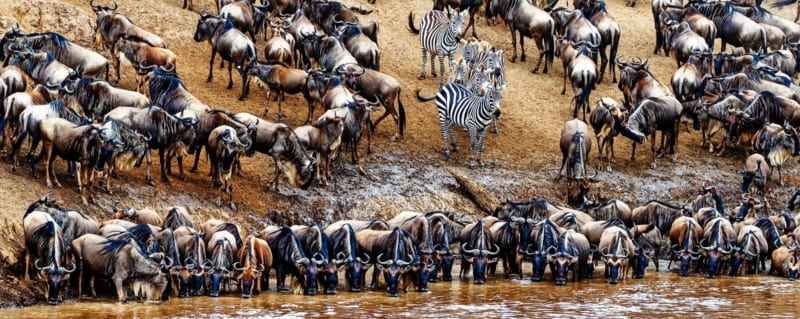
Each year, more than 1.5 million wildebeests, accompanied by zebras, gazelles, and eland, embark on a treacherous journey across the vast Serengeti ecosystem in Tanzania — a natural phenomenon famously known as The Great Wildebeest Migration. This breathtaking event is not just a highlight of African safaris; it’s the largest terrestrial mammal migration on the planet.
What Is the Wildebeest Migration?
The migration is a continuous, circular movement of animals following the seasonal rains and fresh grazing. Starting in the southern Serengeti plains around January to March, where calving season takes place, the herds then move northwest toward the Grumeti River around May to June, and eventually head to the northern Serengeti and Maasai Mara in Kenya between July and October, crossing the dangerous Mara River, filled with crocodiles and dramatic scenes of survival.
By November, rains return to southern Tanzania, and the herds make their way back to the Serengeti, completing the cycle.
Best Time to Visit Tanzania for the Migration
- January – March: Calving season in the southern Serengeti — ideal for witnessing baby wildebeests and predator action.
- June – July: River crossings begin in the western corridor (Grumeti River).
- July – October: Most famous period — dramatic Mara River crossings in the northern Serengeti.
- November – December: Herds return to the south as the short rains begin.
Where to Stay
Tanzania offers a range of accommodations to witness the migration:
- Mobile tented camps that move with the herds.
- Luxury lodges with panoramic views.
- Mid-range options for comfort and value.
Examples include Kenzani Mobile Camp, Lemala Kuria Hills, and Serengeti Serena Lodge — all strategically located to give you front-row seats to the action.
Why Tanzania?
While the migration spills into Kenya, the majority of the journey — over 75% — happens within Tanzania’s Serengeti National Park. Combining this with the nearby Ngorongoro Crater, Lake Manyara, and Tarangire, Tanzania offers a complete safari circuit, rich in wildlife, landscapes, and culture.
Final Thoughts
The Great Wildebeest Migration is not just a safari; it’s a life-changing experience. Whether you're a photographer, wildlife enthusiast, or first-time visitor to Africa, witnessing this grand spectacle in Tanzania is something you'll never forget.
